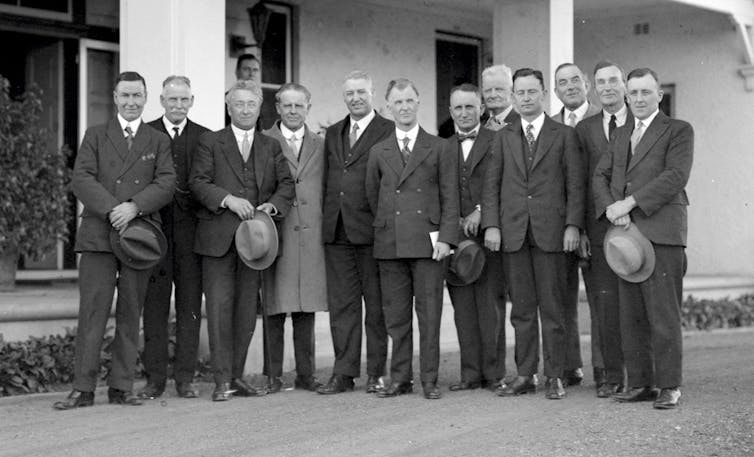how biographies play a role in the building and rebuilding of political careers
- Written by Mark Kenny, Professor, Australian Studies Institute, Australian National University

After decades covering federal politics in Canberra, my embarrassment at not knowing Warren Denning’s Caucus Crisis: The Rise and Fall of the Scullin Government (1937) was partly assuaged when an older colleague revealed the same.
Written by a lion of early political reporting in Canberra, it was the first of what would become a line of political books to emerge from the federal parliamentary press gallery.
Review: Political Lives: Australian Prime Ministers and Their Biographers – Chris Wallace (UNSW Press).
Denning’s book was also the first quasi-contemporary exposition of a dramatic political upheaval – in this case, how the Great Depression rocked politics and overwhelmed the new Scullin Labor government. That government’s defenestration in January 1932 earned it an enduring place in our electoral records. It is (still) the only single-term federal government since the two-party system settled into its current pattern.
“Before Denning, no Australian journalist had let readers in to the private interactions between them and the politicians they reported on in this way,” writes historian and biographer Chris Wallace in her engrossing book Political Lives: Australian Prime Ministers and Their Biographers. Caucus Crisis, she argues optimistically,
was something of a “wholesale” classic, notable in the political confines of Canberra because of its continuing reputation and availability to politicians and journalists through the Parliamentary Library, but not widely known to the public.
While acknowledging that Denning’s account was “contemporary history rather than contemporary biography”, Wallace, a professor at the University of Canberra, justifies its inclusion in her book by noting that it
relies heavily […] on brief evocative portraits of key political players including Jack Lang, E.G. “Red Ted” Theodore, “Stabber Jack” Beasley, and Scullin himself.
In this sense, Caucus Crisis was a vanguard of journalism. It set out to humanise both political events and their reportage, while conforming to the standard devices used to temper excessive subjectivity.
Practical fiction
The admixture is familiar to Wallace as an academic historian and erstwhile parliamentary journalist, and it gives Political Lives its narrative momentum and scholarly heft. Her admiration for Denning’s boldness in both of these spheres shines through in simple passages like this:
Denning’s account is innovative in several ways, not least making the presence, role and anxieties of Depression-era political journalists explicit. Denning lets readers in too, on the behind the scenes interactions between journalists and politicians.



















